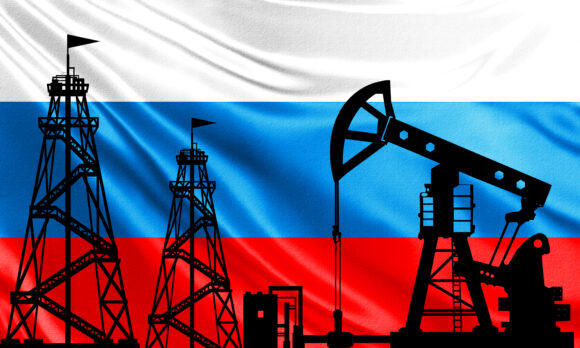Britain targeted Russia’s two largest oil companies, Lukoil and Rosneft, and 44 shadow fleet tankers on Wednesday in what it described as a new bid to tighten energy sanctions and choke off Kremlin revenues.
Lukoil and Rosneft were designated under the Britain’s Russia sanctions laws for what London described as their role in supporting the Russian government. They are subject to an asset freeze, director disqualification, transport restrictions, and a ban on British trust services.
The two companies were considered strategically significant to the Kremlin, the government said, adding that their activities were of economic importance to Russia, contributing to state revenues that help sustain its war in Ukraine.
Britain Will Try to Stop Moscow From Funding War
“We are introducing targeted sanctions against the two biggest oil companies in Russia, Lukoil and Rosneft,” Britain’s finance minister Rachel Reeves told reporters while on a trip in the United States.
“At the same time, we are ramping up pressure on companies in third countries, including India and China, that continue to facilitate getting Russia oil onto global markets.”
Also designated by London were Chinese refiner Shandong Yulong Petrochemical and several port operators – Shandong Jingang Port, Shandong Baogang International and Shandong Haixin Port, all in the refining hub of Shandong.
Yulong Petrochemical, a joint venture between private aluminum smelter Nanshan Group and provincial government-backed Shandong Energy Group, is China’s newest refiner with processing capacity of 400,000 barrels per day. It is one of the largest Russian oil buyers by refinery, according to traders.
Yulong Petrochemical did not respond to a request for comment.
Russia’s embassy in London said the sanctions would backfire by destabilizing global energy markets and pushing up costs for British businesses and consumers.
“Contrary to the loud assurances of British leaders, these restrictions will not have any impact on the Russian foreign policy course,” the embassy statement said.
Reeves said there was “no place for Russia in global markets” and that Britain would take all necessary steps to stop Moscow from funding its war in Ukraine.
Rosneft is Russia’s leading oil producer, accounting for around 40% of the country’s total output, and Lukoil is the second-biggest, with the largest foreign exposure among its domestic peers.
Neither Rosneft nor Lukoil immediately replied to a request for comment.
The new sanctions target 51 ships, including 44 within the so-called shadow fleet and seven LNG vessels, as well as individuals and entities across sectors including energy and defense.
The latest sanctions also include seven liquefied natural gas tankers and the Chinese Beihai LNG terminal, which has been importing cargoes from the sanctioned Russian Arctic LNG2 facility, Britain said.
Nayara, a Russian-owned refinery based in Mumbai, India, was among the sanctioned companies.
The refiner, whose biggest shareholder is Rosneft and has already been sanctioned by the European Union, is scrambling to sustain operations.
Nayara, which has condemned the EU sanctions, did not immediately respond to a Reuters request for comment.
Disruption to Shipping and Insurance for Russian Oil
The measures taken by Britain will reduce ship and ship insurance availability for Russia, as some volumes of Russian oil were still being transported and insured on their routes to Asia by British-based companies, traders familiar with Russian oil sales said.
That meant more Russian oil trade would migrate towards the shadow fleet, which uses non-Western insurance and services, the traders said.
The number of ships in the shadow fleet already exceeds 1,500, according to estimates by Western experts, so there is no shortage of ships to transport Russian oil.
However, several Chinese and Indian ports have in the past refused to unload tankers from the shadow fleet, further complicating Russian oil sales.
The shadow fleet has increasingly been the target of sanctions from Britain, the U.S. and the EU since Russia’s invasion of Ukraine in February 2022.
It is a network of older tankers that officials say are used to avoid sanctions on Russian oil.
(Reporting by Muvija M and Sam Tabahriti in London, additional reporting by Nidhi Verma in New Delhi; Writing by Sam Tabahriti; Editing by Ed Osmond and Alex Richardson)
Topics Russia
Was this article valuable?
Here are more articles you may enjoy.



 Fla. Commissioner Offers Major Changes to Citizens’ Commercial Clearinghouse Plan
Fla. Commissioner Offers Major Changes to Citizens’ Commercial Clearinghouse Plan  Viewpoint: Runoff Specialists Have Evolved Into Key Strategic Partners for Insurers
Viewpoint: Runoff Specialists Have Evolved Into Key Strategic Partners for Insurers  US Supreme Court Rejects Trump’s Global Tariffs
US Supreme Court Rejects Trump’s Global Tariffs  Munich Re Unit to Cut 1,000 Positions as AI Takes Over Jobs
Munich Re Unit to Cut 1,000 Positions as AI Takes Over Jobs 

